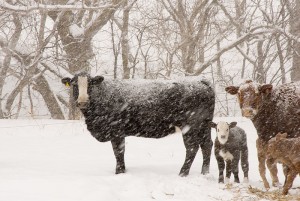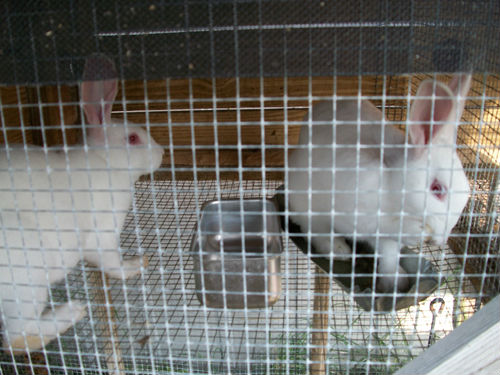Winter Survival - Winter Care for Livestock and Keeping Animals Alive in Winter

Winter survival calls for some extra thought and preparation and when it comes to extreme cold, the first steps are to stay warm and dry to live through frigid temperatures. Even if you are in a subtropical climate, unusual weather patterns such as a polar vortex can bring extreme cold even to southern regions or a major climatic changing event could bring cold weather for an extended time.
The owners of domestic animals are responsible for the animals’ welfare and providing protection from the extreme weather, adequate food and drinking water. After a catastrophic event, it can be difficult to provide what your animals need.
Livestock and Winter Survival
You need to keep your animals dry and warm and with livestock such as cows, they need extra grain to generate enough body heat for winter survival. You can use hay bales, or even a grove of trees, as windbreaks and you must provide some type of bedding for the animals, such as broken bales of straw to protect them from the frozen ground.
Pigs are susceptible to extreme cold and need protection as well as extra food to generate enough body heat. A draft free small enclosure with plenty of hay for a dry area in which to burrow and sleep increases their chances of getting through a cold spell.
Goats are hardier animals and those breeds with undercoats can handle the cold provided that they are out of drafts, and stay dry. You dress them in dog coats for extra warmth and they too need extra food during the extreme cold. Having more than one goat allows them to huddle together for extra warmth.
You need to provide plenty of water and with all their other needs, sometimes keeping large livestock is more than you can handle. Rather than letting them suffer and die, the humane and practical action is to euthanize them and harvest their meat and hides.
Poultry
Birds such as chickens or ducks need protection from the extreme cold and need extra food as well. Chickens and ducks will get through the cold weather if they are housed in coops that are properly ventilated with roosts above the floor, clean and dry bedding and access to fresh clean water.
Rabbits and Guinea Pigs

For winter survival, rabbits need extra water too, and most of all they need to be protected from the wind and drafts but they do better in extreme cold versus extreme heat. Guinea pigs are not as hardy for cold and bringing them into your warmer living quarters might be necessary to ensure their winter survival.
Water
For all your warm-blooded animals, dehydration is a danger in the wintertime and you should not assume they would break a hole in the ice of a pond, stream or water bucket for a drink. Warm drinking water often entices them to drink when they are hesitant and it will help them maintain their body heat.
Fish
If you are raising fish in barrels, you are going to have to either move the barrels to a place above-freezing temperatures or heat the water, as the barrel will freeze solid in extreme cold killing your fish. You can harvest your fish and bring a few fish into your living quarters to have stock when the weather gets warmer. In the cold the metabolism of fish slows, so they have minimal food requirements.
If you are raising your fish in a pond that is at least three feet deep, the danger of it freezing solid is reduced, as once the surface freezes, it takes a long time for the water below it to freeze. In a small pond you need to oxygenate the water and allow methane gas from decaying plants to escape.
Winter survival brings its own challenges in a post-apocalyptic world beyond the need to protect your family and animals and provide for them. With consideration and planning, you will have the necessary provisions to overcome the life threatening difficulties of extreme cold.
Return from Winter Survival for Livestock to Backyard Farming





New! Comments
Have your say about what you just read! Leave me a comment in the box below.